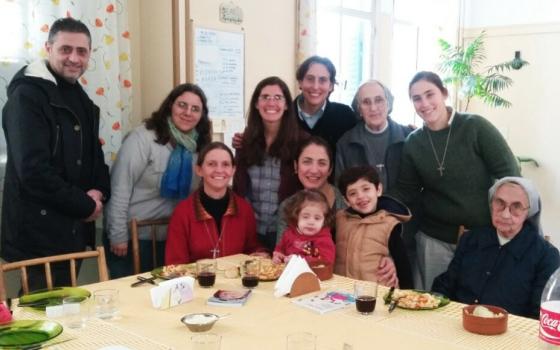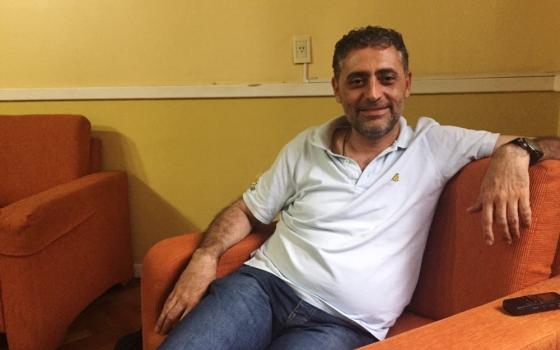"When a country is at war, there's no such thing as a safe place," said Fadi Ali, a Syrian refugee currently living with Handmaids of the Sacred Heart of Jesus sisters in Buenos Aires.
Ali is from Latakia, the fifth-largest city in Syria, which is considered one of the safer zones in the war-torn country. However, Ali clarified, "safe" just means there's no direct military combat in the city itself. "But that doesn't mean the people are safe."
"Armed groups are still aiming their missiles to the cities. Every day, we have a bomb, and people are kidnapped by extremists. People are dying there, but you still have to walk the streets to get to work," said Ali, 38. "You have to keep living your life. Just imagine that every time you leave your home, you have to say goodbye to everybody because you don't know if it'll be OK and that you'll be back.
"That's why you can't say it's safe," he said.
Six years of war has left those in Syria without electricity, water, gas, fuel, medicines, or vital imports, Ali said, and prices increase exponentially while salaries remain the same. "When we talk about war, it's not about missiles or bombs or arms. We're talking about people who can't find basic things to survive. Life is not just a matter of living or dying."
Ali now lives in a Catholic school building, where Handmaids of the Sacred Heart of Jesus sisters took him in, with his wife, Hanan, and their two children, ages 7 and 2, setting up an apartment on the fifth floor. Following a year of online communication and phone calls with the sisters, it is in this apartment where the Alis began their transition from a life amid war in the Middle East to a safe yet foreign life in South America.
Those who think too much about whether or not to take in refugees are not likely to get results, said Handmaid of the Sacred Heart of Jesus Sr. Constanza Di Primio, who sponsored the family's move. "If I got all the sisters together and asked everyone their opinion about taking in a family, and go through all the pros and cons, [the Alis] would probably still be in Syria. I learned that it pays off to just follow God's signs."
'We came here in search of life'
This wasn't always Fadi Ali's life: 8,000 miles and a war ago, Ali worked a comfortable, upper-middle-class job as an agricultural engineer, while Hanan Ali worked for a multinational cellphone company.
But when war broke out in 2011, Fadi Ali "left everything" to volunteer with the government in a ministry intended to resettle displaced Syrians within the country, which he said amounted to about 600,000 people in his city. (The total number of displaced Syrians within the country is close to 6.3 million, while another 5 million have been driven into exile.)
Around 2013, he moved on to represent Latakia at the Ministry of National Reconciliation, where his job was to foster dialogue and rebuild relationships between opposing parties. However, "it's mission impossible in Syria."
He left Syria in 2015, when the sisters offered to sponsor his family through the Foundation of the Argentine Catholic Commission on Migration, providing a humanitarian visa for a move to Buenos Aires.
"We wanted to do more than just cry watching the news on TV," said Sr. Marialis Etchegaray, a Handmaid of the Sacred Heart of Jesus.
Initially, she and Di Primio assumed their counterparts in Europe could do more for those fleeing the Middle East than they could in South America.
"Our first reaction was, we're so far away, all we can do is pray," Di Primio said, though eventually, their group of eight sisters began to feel "uncomfortable, like we're normalizing the pain. We decided to reject the discomfort that comes with distance, and we began to think what we can do from here."
"When the desire to do good kicks in, the path illuminates itself," said Etchegaray, adding that they were especially inspired by Pope Francis' message that invited all religious life to open the doors of their institutions to those seeking refuge.
"It turned out to be a fairly uncomplicated gesture, so I want people to know that taking in a family is really within their grasp," she said.
They welcomed the Ali family, including Hanan's sister, in March 2015. Upon seeing the apartment set up for them, Hanan Ali grew emotional, Etchegaray said, both out of gratitude and because it was "a reminder of how far they were from war, realizing that she was at the other end of the world, as far as can be from her family and friends."
On the day they moved into their new apartment, Fadi Ali told the sisters, "We didn't come here to escape death, because nobody can escape death. We came here in search of life."
However, the family rarely left the apartment their first several months in Buenos Aires. The two sisters said they later understood that this was a sign of the "imprint that war leaves on people," Di Primio said.
Hanan Ali eventually told Di Primio that she did not leave the apartment because she had lived in fear for the last five years.
"Of course, that's nothing you can shake," Di Primio said. "Now they go out and see the city, but it's a reminder that learning how to properly accompany them is an ongoing discovery. It's not enough to think, 'OK, here we're not getting bombed, so go outside!' "
Open opportunities in Buenos Aires
"There are a lot of people suffering silence, dying of silence, so I will try to be their voice here," Fadi Ali said. "I will try to make their screams, their suffering, heard here — not just in Argentina, but all over the world."
Continuing similar work from his time in Syria, Ali now works for a government ministry that tackles international social development. His department is devoted to creating public policy that provides aid to Syrian programs.
"I'm all the Syrian people. My kid is every Syrian kid. My wife is every Syrian woman. Don't think too much about my personal story. I'm here to talk about every story of every refugee, and there are 10 million stories, not just mine. They are not numbers, and they will never be numbers to me ... and all the doors are closed on them."
Ali said he is aware it was pure luck when the program selected him and his family to be the ones to move to Buenos Aires, and that, despite knowing Arabic, English and Spanish, "if no one knows I exist and need help, then [my experiences and languages don't] matter."
The Ali family and the sisters in Buenos Aires communicated every day prior to the move on Facebook, Skype and WhatsApp.
"When we got here, we felt like we were coming to our house; they never felt like strangers to us," Fadi Ali said of the sisters.
And while Syria's questionable future blurs the Ali family's decision of whether or not they will return to Syria, the fact that there is a space carved out for them, he said, makes it "feel like I'm already in my home."
The Handmaids of the Sacred Heart of Jesus and the parents of his children's classmates, Ali said, "invite us and treat us as friends, not as refugees. That's important to feeling integrated in a new country."
That Argentina is a largely immigrant country eased the transition for the Ali family. Ali said he often feels like he's in Syria because the city has its own collective of Syrians, and Di Primio noted that the "middle-class profile" of Syrians keeps Argentines from feeling threatened that they'll either steal their jobs or steal from them.
"When you ask [Syrians] why they chose to come to Argentina and not Germany, for example, they'll say that their friends in Germany say that though the government provides for them and subsidizes a lot, they experience intense social rejection," Di Primio said. "That's not the case here."
"But, you also can't ignore the attitudes that pass through the rows of our churches and congregations," she said. It "always shocks me when I speak with other religious who say, 'Make sure the family is Christian.' ... A human being should not be sized up by his creed."
Though his family is Alawi Muslim, Ali said he has his own relationship with God and he doesn't need a mosque or church.
"For me, God is simpler and bigger than these traditions. I'm Muslim and Christian at the same time," he said. "I don't put myself in a narrow corner or [subscribe to] the human thinking of God."
Ali asked to pray in the same chapel where the sisters prayed for him and his family before he arrived in Buenos Aires. He later sent the text of one of his prayers to the sisters.
"In this prayer, you don't think Islam or Catholicism," Di Primio said. "You just feel that God is the same for all man, that we all feel him the same."
'Danger is never too far away'
To the international community, especially those who are apathetic, apprehensive or fearful of refugees, Di Primio says to take notice of people who are "living tragedies they did not choose."
"It fell on their laps, being protagonists with front-row seats to war. They are not the war's playwrights," she said. "The playwrights are the influential, who have economic or political interests, who expose human beings to a high risk of not just life or death, but of living in fear in precious situations, to live with bombings or kidnappings."
To Ali, the sisters who took him in are "the best followers" of Jesus, and those who believe in whatever God they want, whatever prophet they want, must consider what those prophets would do today, he said.
"I feel that God entrusted us, as a congregation, to be his innkeepers, to be the ones who say, 'Come, we have room,' " said Di Primio, who said she grew emotional when she signed the documents to accept the Alis. "Not keeping your gifts to yourself is more than just a romantic notion: It's life-giving if you know how to orient them."
Ali said Syrians had not been too concerned about Libya's troubles during the 2011 uprisings under then-Prime Minister Moammar Gadhafi because it felt far away.
"We were lazy," Ali said. "But danger is never too far away." People should look outside their room or their televisions to really see what's happening around the world, he said.
"Having a war is easy, but making peace and keeping the peace requires a real man, an honest man, so now I'm speaking to those honest men. They are the ones who must hear me now and start working toward that now."
[Soli Salgado is a staff writer for Global Sisters Report. Her email address is ssalgado@ncronline.org Follow her on Twitter @soli_salgado.]
Related stories - Remembering displacement
Ontario sisters answer call, welcome Syrian refugees in Canada





